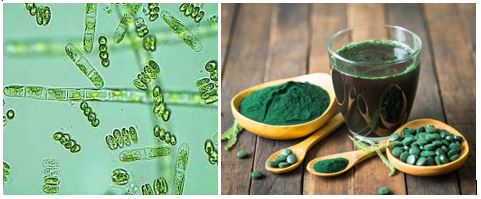Spirulina (Arthrospira platensis) belonging to the family Spirulinaceae is a free-floating filamentous microalgae to the class Cyanobacteria. Spirulina is an ecologically sound, nutrient-rich super-food that is grown all around the world as a dietary supplement. Spirulina is considered as the “Food of the Future” that will effectively tackle the existing malnutrition problem and now it is high time to give most priority to producing spirulina for consumption on our daily meal.
Spirulina is a blue-green algae and a natural food found in high alkaline aqua environments. Spirulina under a microscope looks like little spirals and grows quickly under suitable conditions. Ancient civilization grew their Spirulina in lakes and ponds. Now a day’s Spirulina producers grow spirulina in controlled aqua environments to ensure the quality and safety of spirulina. So determining the quality and safety of spirulina is most important to consider the water source and growing environment. Spirulina is one of the oldest food sources because of its high nutritional value. Spirulina is known to be a rich source of protein (up to 70%), contain essential and non-essential amino acids, gamma-linolenic acid (GLA), Vitamin A (Beta-carotene), B-12, iron, calcium, chlorophyll and phycocyanin.
Consequently, the commercial production of Spirulina has gained worldwide attention for use in human food supplements, animal feed and pharmaceuticals. In aquaculture, Spirulina is used as a feed additive to improve growth, feed efficiency, carcass quality and physiological response to disease in several species of fish. Furthermore, it is the richest algal source of Gamma-linolenic acid (GLA), a precursor for the biologically-active compound (Prostaglandins, PGE1) which is necessary for the enhancement of the immune system in the shrimp larvae.
According to the World Health Organization (WHO) Spirulina is an interesting food rich in iron and protein which can be administered to children without any risk. WHO also declared it as the best food for the future. Spirulina won “The Best Natural Food” award in Germany's International Food Expo. The United Nations has conducted a 5-years toxicology study on Spirulina and found it to be completely non-toxic! National Aeronautics Space Administration (NASA) scientists from the USA tested and found that 1 kg of Spirulina is nutritionally equal to 1,000 kg of assorted vegetables and fruits. Spirulina can be added to all kinds of smoothies and shakes, as well as desserts and main dishes.
Khondokar Abu Sayem
ASRBC, ACI Seed, ACI Ltd.




